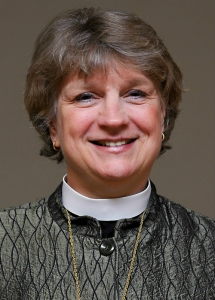 By Bishop Ann Svennungsen
By Bishop Ann Svennungsen
Healthy relationships matter. Human flourishing is irrevocably tied to the health of our relationships – with family, friends, co-workers, teachers, classmates.
Healthy church relationships matter, too. Indeed, unhealthy church relationships can be destructive in uniquely painful ways.
Tragically, the church has often done a poor job preventing and addressing misconduct in parish relationships. When I was in grade school, a pastor who admitted to sexual misconduct was given some weeks in “therapy,” and then transferred to another congregation where the abuse continued.
“The church should be a safe place for everyone.”
From the start of the ELCA, our denomination has been intentional in developing strong and clear guidelines for preventing and addressing misconduct – thanks, in large part, to the work of the Commission for Women. In 1996, Safe Connections: What Parishioners Can Do to Understand and Prevent Clergy Sexual Abuse was developed. In 2002, the Minneapolis Area Synod published Policy and Procedures for Preventing and Addressing Sexual Misconduct by Rostered Ministers.
THE CHURCH SHOULD be a safe place for everyone – a place where people can worship, learn, work, love, and receive care in a manner that is free from boundary violations, emotional abuse, sexual harassment, or misconduct. When safety is violated, the resulting pain can last a lifetime. And, the relationships that suffer are not only human. If a pastor – called to share God’s love – violates the trust of another, it is not hard to imagine the experience affecting the victim’s trust in the God the pastor was called to represent.
Our synod policy seeks to provide for compassionate and resolute response to those wounded by clergy sexual misconduct and appropriate discipline for those who offend. We encourage each of us to report concerns:
- If you do not feel safe in your church, contact Dee Vodicka, the Executive Assistant to the Bishop, at 612-230-3317 or d.vodicka@mpls-synod.org.
- If you suspect sexual misconduct, reach out to the synod or the ELCA via the website or phone at 800-638-3522, ext. 2699.
- If you aren’t sure what is happening but it’s making you uncomfortable, call us.
“Tragically, the church has often done a poor job preventing and addressing misconduct in parish relationships.”
When our office receives such a call, it gets my complete attention. I personally meet with victims to listen to their allegations, affirm my and the church’s care for them, and refer them to an advocate if desired. I also review all allegations of clergy sexual misconduct and administer appropriate discipline, a process that may include the guidance of an advisory or consultation committee. (It should be noted that the synod may not be able to assume primary responsibility for addressing all allegations of sexual misconduct. For example, law enforcement authorities would have responsibility for investigating and addressing criminal allegations, while congregations would have to deal with accusations of sexual harassment by the congregation’s employees. Nevertheless, the appropriate synod office should be notified of all cases of inappropriate sexual behavior in the congregation.)
Healthy relationships of trust and respect are essential to the mission of the Gospel and for the flourishing of all God’s children. May we carefully and resolutely attend to both the prevention of and healing from sexual misconduct in our faith communities.
